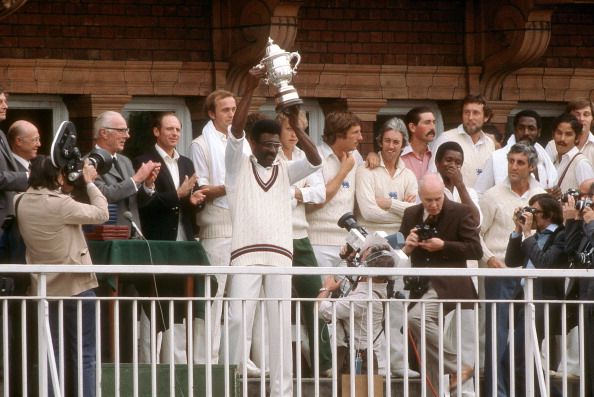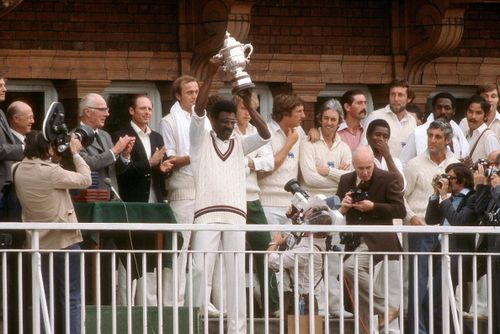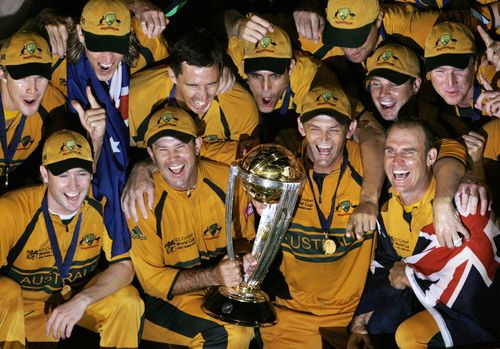
Fantasy Cricket World Cup: Battle of the champions

Ever wondered what would happen if all World Cup-winning teams came up against each other in a tournament? Who would win such a competition? I’m sure most of us have thought about this at some point or the other.
Here, we have attempted to come up with a fantasy tournament which pits all the World Cup-winning teams against each other. Teams, that won World Cups in succession have been clubbed together so that one player isn’t part of two teams:
Playing XIs
West Indies 1975-1979: Desmond Haynes, Gordon Greenidge, Vivian Richards, Alvin Kallicharran, Rohan Kanhai, Clive Lloyd, Deryck Murray, Andy Roberts, Joel Garner, Michael Holding, Colin Croft.
India 1983: Sunil Gavaskar, Kris Srikkanth, Mohinder Amarnath, Yashpal Sharma, Sandeep Patil, Kapil Dev, Kirti Azad, Roger Binny, Madan Lal, Syed Kirmani, Balwinder Sandhu.
Australia 1987: David Boon, Geoff Marsh, Dean Jones, Allan Border, Mike Veletta, Steve Waugh, Simon O'Donnell, Greg Dyer, Craig McDermott, Tim May, Bruce Reid.
Pakistan 1992: Aamer Sohail, Rameez Raja, Imran Khan, Javed Miandad, Inzamam-ul-Haq, Ijaz Ahmed, Saleem Malik, Moin Khan, Wasim Akram, Mushtaq Ahmed, Aaqib Javed.
Sri Lanka 1996: Sanath Jayasuriya, Romesh Kaluwitharana, Asanka Gurusinha, Aravinda de Silva, Roshan Mahanama, Arjuna Ranatunga, Hashan Tillakaratne, Kumar Dharmasena, Chaminda Vaas, Pramodya Wickramasinghe, Muttiah Muralitharan.
Australia 1999-2007: Adam Gilchrist, Matthew Hayden, Ricky Ponting, Damien Martyn, Darren Lehmann, Michael Bevan, Andrew Symonds, Shane Warne, Brett Lee, Damien Fleming, Glenn McGrath.
India 2011: Virender Sehwag, Sachin Tendulkar, Gautam Gambhir, Virat Kohli, Yuvraj Singh, MS Dhoni, Suresh Raina, Harbhajan Singh, Zaheer Khan, Ashish Nehra, Munaf Patel.
Considering, this tournament consists of 7 teams – an odd number – it was tough to come up with a format to accommodate all the sides. I couldn't divide them into two groups nor could I start the tournament with an evenly balanced knockout phase.
Hence, I decided to give the oldest team in the competition – the West Indies – a bye into the semi-finals. The other six teams were drawn by the year(s) they won the World Cup in. The older teams were grouped together and relatively newer winners were pitted against each other.
Quarter-finals
West Indies (bye to the next round)
India (1983) vs Australia (1987)
Both these sides were far from being favourites when they entered the World Cup. Some brilliant performances from some of their lesser known players and inspirational captaincy saw India and Australia lift the World Cup in 1983 and 1998 respectively.
These two teams are bound to involved in a close encounter, but with Australia's slightly superior batting lineup, one would be tempted to go with the 1987 champions to win this game.
Winner - Australia (1987)
Pakistan (1992) vs Sri Lanka (1996)
Just like India and Australia before them, both Pakistan and Sri Lanka weren't considered huge favourites at the start of the 1992 and 1996 World Cups respectively. Other countries had better squads in 1992 and 1996, but these two teams had the best ODI captains playing for them.
Imran Khan's innovative captaincy, which included promoting himself to number 3 in the semi-final and final and using Wasim Akram as a pinch-hitter in the final, worked like a treat. On the other hand, Arjuna Ranatunga took a page out of Martin Crowe's book and used pinch-hitters at the top of the order which would change limited-overs cricket forever.
A match between these two sub-continental sides will sure provide a lot of entertainment for the neutral with both sides playing an attacking brand of cricket. In the end, I'd expect Pakistan to win this game because of their superior fast bowling attack. Akram and Imran should be more than a handful for the Sri Lankan batting lineup.
Winner - Pakistan (1992)
Australia (1999-2007) vs India (2011)
India, in 2011, surely had one of the greatest batting lineups the world has ever seen. With Sehwag and Tendulkar at the top, and a middle-order consisting of Gambhir, Kohli, Dhoni and Raina, it came as no surprise that the hosts won the World Cup at home four years ago.
Despite their batting strength, India simply do not come close to the prowess of Australia's teams from 1999 to 2007. The domination of the men from down under was such that they did not even lose a single match in the 2003 and 2007 tournaments.
Although, there isn't much to separate the batting of the two teams, the bowling of the Australian team is on another galaxy. With Glenn McGrath – the most successful bowler in World Cup history – and Shane Warne – often considered the greatest leg-spinner to have played the game – in their ranks, Australia are at a huge advantage in this match.
Indian fans won't like this, but both of India's World Cup-winning squads have been knocked out in the quarter-finals.
Winner - Australia (1999-2007)

Semi-finals
West Indies (1975-1979) vs Australia (1987)
After receiving a bye in the quarter-finals, West Indies shouldn't have much of a problem in getting past Border's Australia in the semi-finals. The West Indian fast bowling attack of Andy Roberts, Joel Garner, Michael Holding and Colin Croft should be too good for the Australians, despite the latter having a strong batting lineup.
The Clive Lloyd-led side also had one of the strongest batting lineups in World Cup history, including a certain Vivian Richards in their ranks.
If you are wondering why Malcolm Marshall, often considered the best fast bowler during West Indies’ golden generation, did not make this team – it is because he made his ODI debut only in 1980!
Winner - West Indies (1975-1979)
Pakistan (1992) vs Australia (1999-2007)
Wasim Akram, Imran Khan, Mushtaq Ahmed and Aaqib Javed on one side. Glenn McGrath, Brett Lee, Shane Warne and Damien Fleming on the other. This match will be a delight for those who like to watch high-quality bowling attacks in action.
When it comes to the batting, there seems to be a clear winner in this contest – Australia's batting lineup is head and shoulders ahead of Pakistan's. Australia have as complete a batting lineup one could wish for, with an explosive opening partnership, a solid middle order and one of the greatest LOI finishers of all time in Michael Bevan.
Hence, Australia will be expected to beat Pakistan in this encounter.
Winner - Australia (1999-2007)
Final
West Indies (1975-1979) vs Australia (1999-2007)
The final is between, unarguably, the two greatest World Cup-winning teams ever. If cricket fans had a time machine, most of them would say that they'd want to watch these two great sides come up against each other.
A match between these two will surely be a close contest. West Indies seem to have a better captain in Clive Lloyd, but Australia have the luxury of having a world-class spinner in their ranks. The biggest drawback of the West Indian team is that, despite possessing of a terrifying bowling attack, there isn't much variation to it. Shane Warne could be the huge difference maker in such a game.
Both sides have incredibly strong batting lineups, with two of the greatest opening pairs on display. In the middle order, we have Richards, Kallicharran, Lloyd and Kanhai on one side, with Ponting, Martyn, Symonds andBevan on the other - which should make this an even contest between bat and ball.
When it comes to the wicketkeeping slot, Australia again have a huge advantage. Adam Gilchrist re-defined the role of a WK in cricket and stands head and shoulders above almost every stumper to have played the game.
I'm going with a victory for Australia, not least because of Warne and Gilchrist.
Winner - Australia (1999-2007)